On June 22, 2024 the Fourth Annual Denver Pollinator/Native Plant Swap & Giveaway Event was held between 10am – 1pm with sunny skies and warm temps reaching 90°F. We appreciate the estimated 700 participants, including volunteers and families, who attended despite construction hassles, lines and heat.

2024 Denver Pollinator/Native Plant Swap & Giveaway at 11:30am
Photo: Idelle Fisher
Our first in line at 9am was a plant donor, of course! Lines spanned the west and north sides of the block during the event. Thanks to all the participants who waited patiently in line for up to one hour, visiting with companions, making new friends and drawing sidewalk art with chalk.
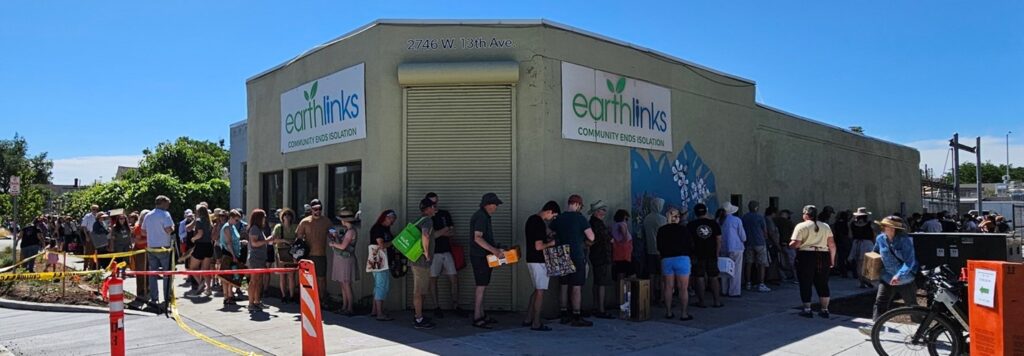
Particpants lined up on West and North sides of the block waiting patiently up to one hour!
Photo: Idelle Fisher
Base inventory (registered online) was 6,734 plants donated by 42 individuals.
71 of the best volunteers EVER began helping prepare for the event in the winter by sowing seeds, creating flyers and website pages, donating recycled supplies, transplanting seedlings, rescuing seedlings from native gardens, babysitting seedlings to grow big enough for swap (watering and protecting from hail), promoting, transporting, setting up and finally, staffing the event. Total volunteer hours 538!
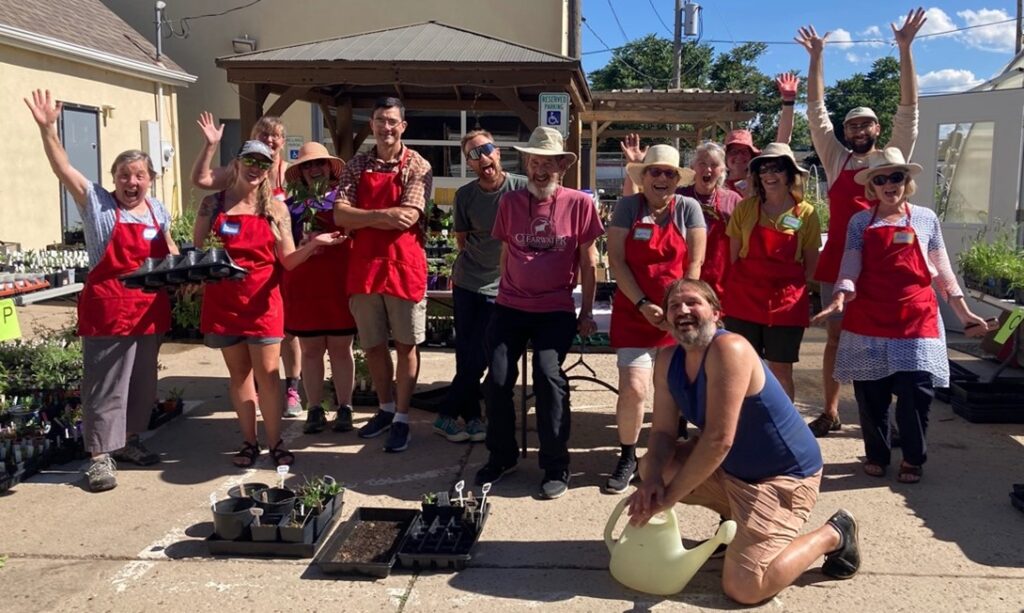
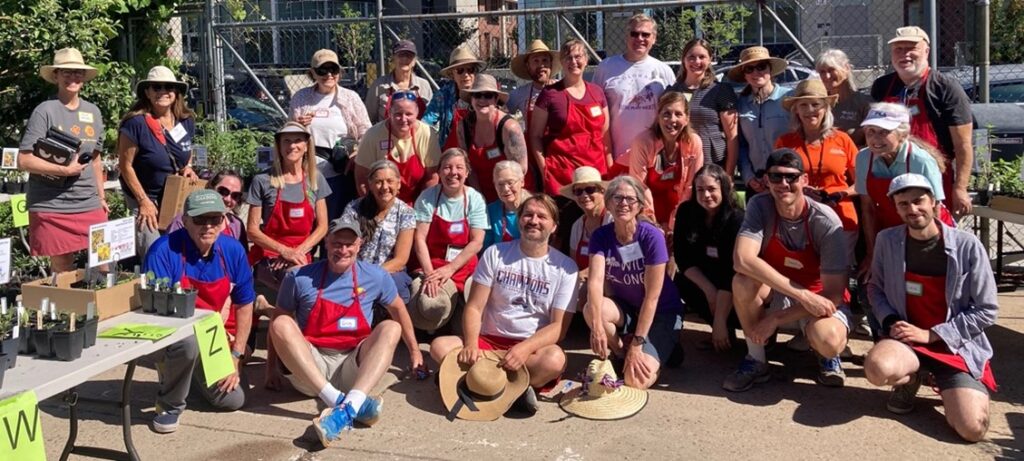
Two of the three event volunteer shifts
Photos: Peggy Hanson
And now for trivia and special mention – People and Plants:
Largest number of single species donated:
- 1st Place – Josie Thulien with 396 Mirabilis nyctaginea. Special mention to her hubby, Craig, for hauling them all to the swap and getting roped in to do more lifting!
- Runner up – Nora Maus with 229 Agastache foeniculum

Craig Clark & Josie Thulien with Mirabilis nyctaginea
Photo: Peggy Hanson
Widest variety of plants donated – Jan Midgley with 83 species!
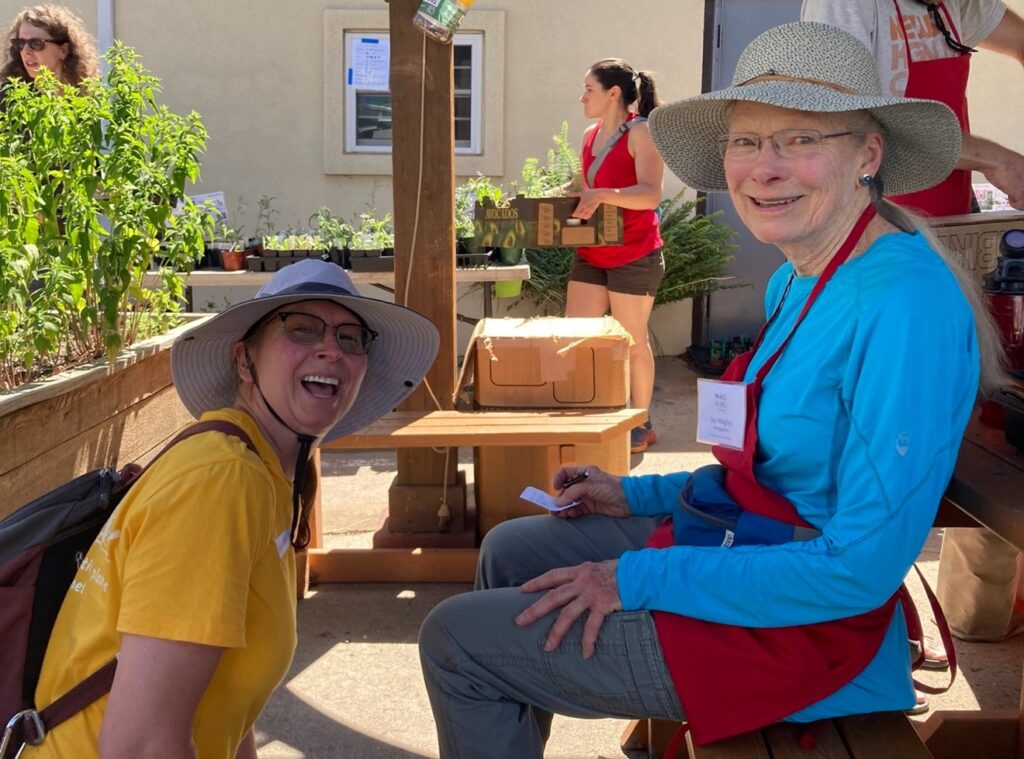
Lisa Olsen, WOFR Past President (left) and Jan Midgley, WOFR Propagation Master (right).
Photo: Peggy Hanson
Most plants propagated for swap – Robert Greer with over 2,000 propagations
(these seedlings were transplanted and grown up by many volunteers)
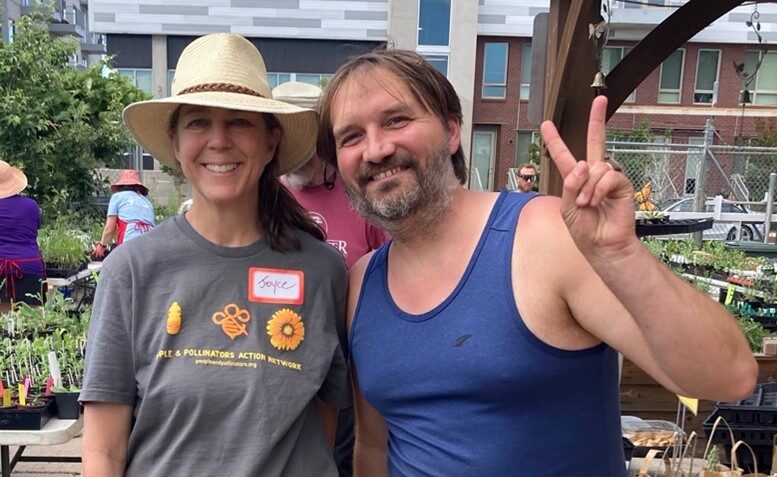
Joyce Kennedy, PPAN Executive Director (left) and Robert Greer, WOFR Propagator Extraordinaire, AKA ‘The Plant Whisperer’+
Photo: Peggy Hanson
Most plants donated for swap by one donor – Nora Maus with >800 plants!
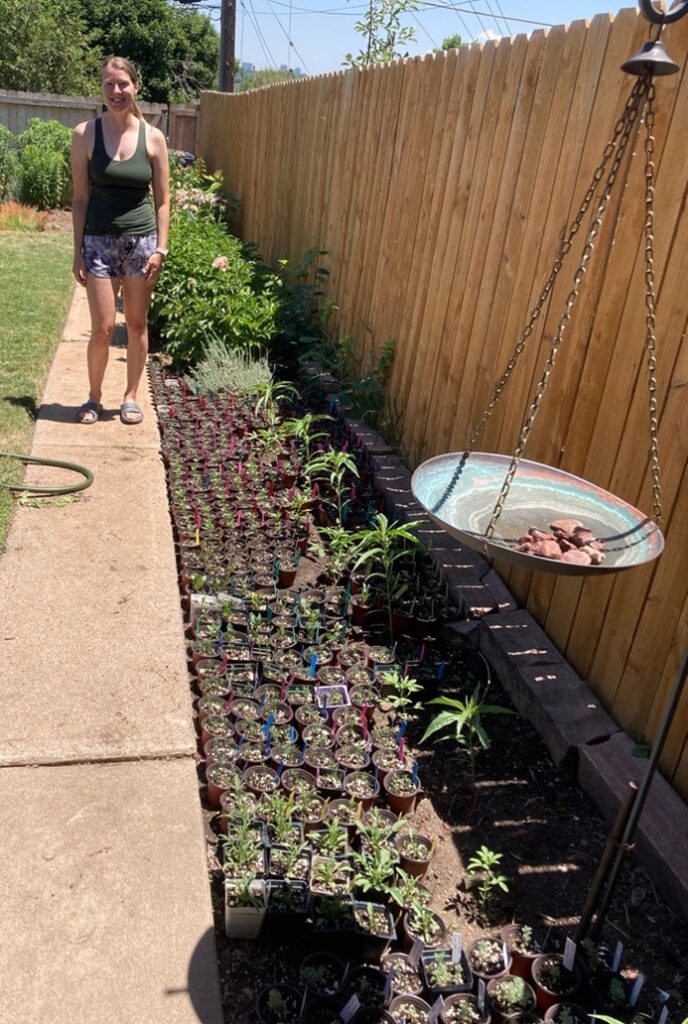
Nora Maus in her backyard-turned-propagation-nursery!
Photo: Peggy Hanson
Volunteer with the most volunteer hours (excluding swap leads)
Idelle Fisher with an estimated 15 hours who designed our fab flyer and promoted the event so strategically on social media.
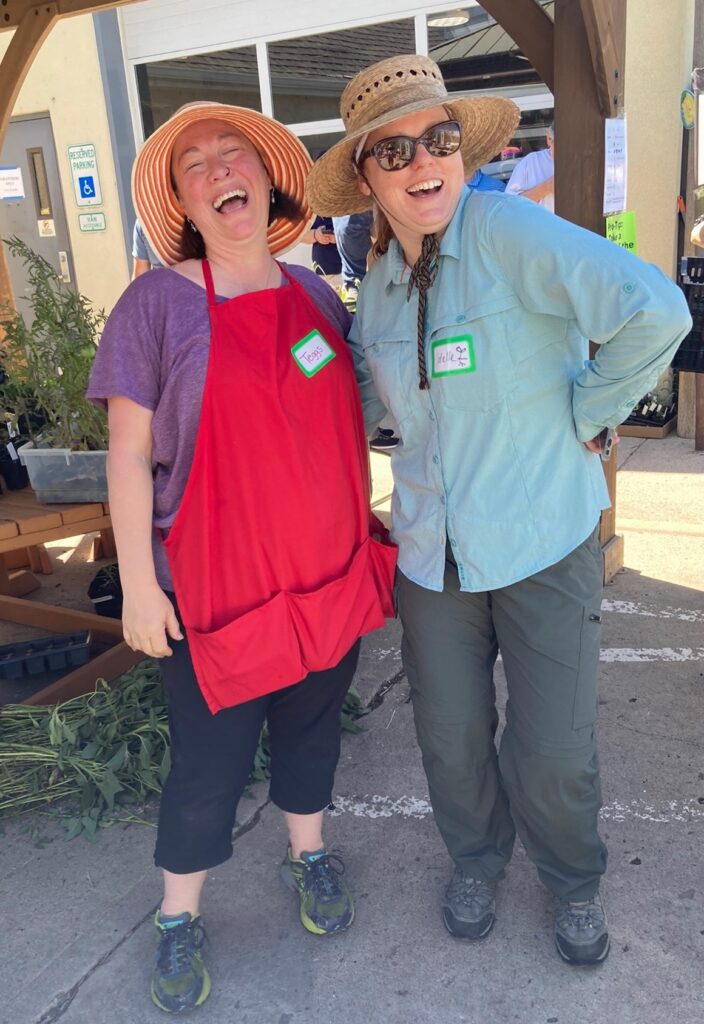
Teri Thomson (left) and Idelle Fisher (right) volunteering at the event.
Photo: Peggy Hanson
Volunteer with the most dirt-related volunteer hours (excluding swap leads)
Diane Koziol with 14.5+ hours logged for transplanting, digging, transporting and staffing the event! (This excludes the time digging from her own garden >50 Helianthus pumilus, Mirabilis multiflora and other natives!)
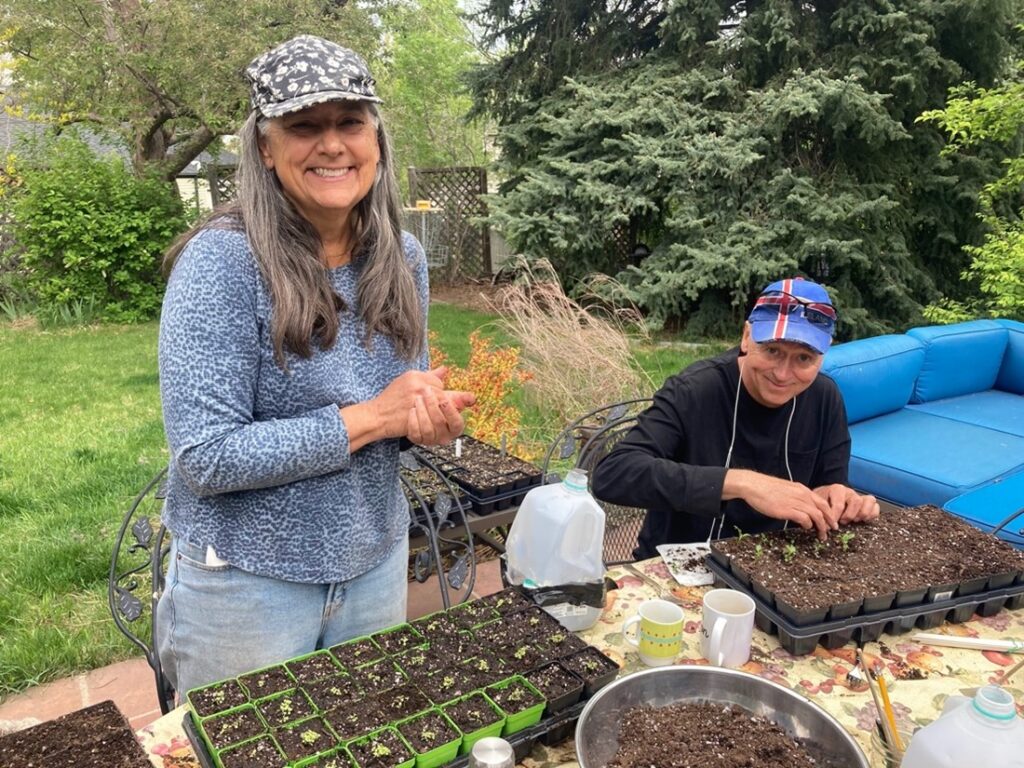
Diane Koziol and husband Alan Yehle transplanting Rob Greer’s jug seedlings.
Photo: Peggy Hanson
Species with the most number of donors:
Penstemon strictus with 10 donors providing 122 plants!
| Inductees into The Hearty Species Club (species for which 100+ plants were donated) These species accounted for over 2,500 of total plants donated! | |
 396 Mirabilis nyctaginea |   343 Agastache foeniculum |
  202 Achillea millefolium |   168 Prunus pumila var. besseyi |
 165 Berlandiera lyrata |  146 Allium cernuum |
 140 Linum lewisii |  136 Celtis occidentalis |
 136 Coreopsis tinctoria |  131 Ratibida columnifera |
 126 Asclepias tuberosa |  125 Heterotheca villosa |
 123 Monarda fistulosa |  122 Penstemon strictus |
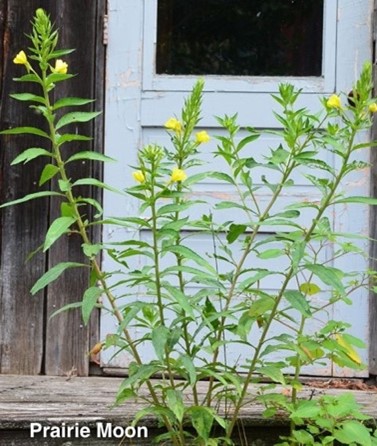  101 Oenothera biennis | |
Mission and Objective
The annual swap is an outreach event. It addresses an accessibility problem; the nursery trade doesn’t carry a sufficient supply of native plants—in part because natives don’t display ‘showy’ like cultivars and in part because they take longer to reach full potential (time is money). The swap sponsors believe that the consumer mindset toward landscaping is changing; we are becoming more aware of our role as ecological stewards to the spaces we own. The swap helps Denver metro area residents get native plants into their landscapes to reduce water consumption, increase pollinator habitat and improve the overall ecology along the Front Range. Hopefully, participants will plant their plants, collect seeds to swap and grow new plants for future plant swaps so the cycle continues.
Sincere thanks to the people and plants that made this possible.
The Swap Partners
Wild Ones Front Range Chapter
People and Pollinator Action Network
EarthLinks
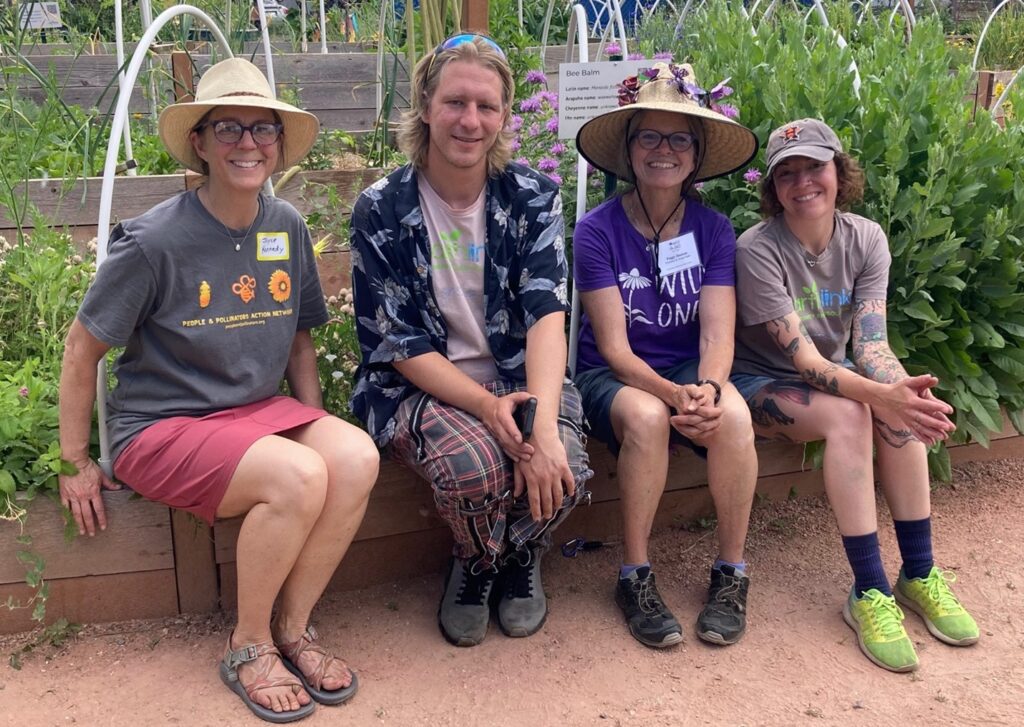
Lef to Right: Joyce Kennedy – PPAN Executive Director, Kevin Person-Horticulturist, EarthLinks; Peggy Hanson – WOFR Treasurer & Swap Chair; Jessica Myers – EarthLinks Executive Director
Photo Credit: Jordyn Bieker
